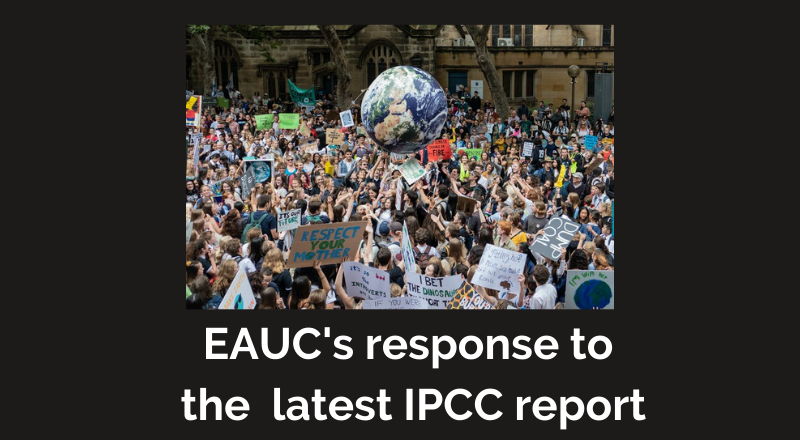The educational sector must show its commitment to the net zero agenda as well as your own institution’s leadership on a global level.
Evidence is irrefutable – collective action to stop the climate crisis is needed now!
Described as “a code red for humanity”, the latest report from the Intergovernmental Panel on Climate Change (IPCC) has warned that major changes due to global heating are inevitable and irreversible with devastating consequences for all life on Earth. The IPCC is the leading world body for assessing the science related to climate change, its impacts and potential future risks, and possible response options.
The report sets out five different pathways that emissions could take in the coming decades, with different “climate futures” attached to them. The pathway in which emissions fall as fast as possible gives us a bit less than a 50% chance of limiting warming to 1.5°C. In this scenario, the world has to limit total greenhouse gas emissions over time to the equivalent of around 500 gigatons of carbon dioxide (CO₂).
The report also shows that at the moment, the world emits around 40 gigatons a year (and growing). That leaves about 12.5 years of emitting at current levels. Therefore, if the world reaches zero emissions by 2050, in each year until then, emissions must be no higher than 40% of 2021’s emissions on average.
To get emissions to peak and then start on a downward trend is fairly simple in theory. These include:
- A ban on new fossil fuel infrastructure. No new coal-fired power plants, no new oil and gas operations, and no airport expansions. In essence, the world could agree a fossil fuel non-proliferation treaty.
- Existing coal plants could be rapidly replaced with renewable sources of energy, like windfarms.
- Radical improvements could be made in the energy efficiency of buildings.
- Natural gas could be eliminated in buildings, replaced with heating and cooking which use electricity.
- Ground transport could be decarbonised by a shift to electric vehicles (cars, trucks, buses, trains) and from cars to bikes, walking and public transport.
We hope the IPCC report will be the central discussion point at the UN climate talks, otherwise known as COP26, which are to be held in Glasgow in November 2021. There is little evidence that leading states are successfully persuading each other to improve their commitments, however it is at this level that people must focus much of their attention, to outweigh the influence of fossil fuel companies, find novel ways to fund decarbonisation and steer the economic recovery from COVID-19 towards a low-carbon future.
Iain Patton, CEO at EAUC said:
“This latest report told the world what it already knew – and added even greater urgency. Code red for humanity’ – Who would have guessed?! Clearly quite a number of our world leaders still don’t fully acknowledge the fatal consequences of inaction, so the pressure is really on for COP26 to deliver tangible and realistic global climate actions.
“Therefore, all of us in universities and colleges, we in climate research, we who embed it into our teaching, we who press for full and honest emissions accounting, and we who have most to lose in our young lives must ensure that COP26 hears our collective voices.
"The educational sector must show its commitment to the net zero agenda as well as your own institution’s leadership on a global level. Ensure that your university or college has signed up to Race to Zero and recognises it’s role by taking on credible net zero emissions and biodiversity restoration targets and delivery plans.”
Read more about EAUC's involvement at COP26 here.
We have a selection of events and training opportunities to equip you with the relevant knowledge to develop a climate action response.











